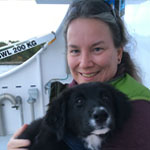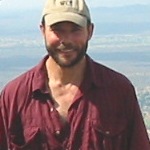Select program/project:
 |
Wildlife Statistician / Conservation Scientist
Samantha Strindberg is a Wildlife Statistician and Conservation Scientist who joined the Global Conservation Program of the Wildlife Conservation Society (WCS) in 2001. She provides statistical design and analysis assistance to WCS colleagues around the world. She focuses in particular on the appropriate application of continually evolving specialized techniques for wildlife surveys, and on conducting statistical analyses to investigate ecological and human-influenced relationships relevant to conservation management and policy.
Samantha also contributes to strategic conservation planning by developing conceptual models and theories of change, and by designing monitoring programs to assess the effectiveness of conservation activities. She provides training workshops on wildlife survey methods and the design of monitoring programs most recently in conjunction with the SMART Ecological Records software. She develops analytical and decision-support software applications as part of her work, such as the Landscape Species Selection software used in the selection of conservation targets. She is a member of the Committee of Scientific Advisors on Marine Mammals with the Marine Mammal Commission. Occasionally, she has the pleasure of participating in field work, most often in cetacean or other marine surveys.
|
 |
Samantha Strindberg
Wildlife Statistician / Conservation Scientist
Samantha Strindberg is a Wildlife Statistician and Conservation Scientist who joined the Global Conservation Program of the Wildlife Conservation Society (WCS) in 2001. She provides statistical design and analysis assistance to WCS colleagues around the world. She focuses in particular on the appropriate application of continually evolving specialized techniques for wildlife surveys, and on conducting statistical analyses to investigate ecological and human-influenced relationships relevant to conservation management and policy.
Samantha also contributes to strategic conservation planning by developing conceptual models and theories of change, and by designing monitoring programs to assess the effectiveness of conservation activities. She provides training workshops on wildlife survey methods and the design of monitoring programs most recently in conjunction with the SMART Ecological Records software. She develops analytical and decision-support software applications as part of her work, such as the Landscape Species Selection software used in the selection of conservation targets. She is a member of the Committee of Scientific Advisors on Marine Mammals with the Marine Mammal Commission. Occasionally, she has the pleasure of participating in field work, most often in cetacean or other marine surveys.
|
|
 |
Director, Conservation Measures
As Director of Conservation Measures for the Wildlife Conservation Society, David Wilkie seeks to strengthen the practice and impact of WCS conservation worldwide. David joined WCS in 2001. Since then he has led efforts to ensure that WCS field programs identify explicit conservation objectives for which we hold ourselves accountable, and tactically monitor and report our conservation progress. Today he leads our 5-measures approach to evidence-based conservation.
He is a founder of the Conservation Measures Partnership – a joint venture of conservation NGOs committed to improving the practice of conservation by promoting adoption of a consensus-based set of standards for planning, implementation and measuring conservation impact. He was co-chair of the Bushmeat Crisis Task Force, and helped establish the Conservation Initiative on Human Rights. He is a member of the WCS Institutional Review Board for protection of human subjects. He is the director of the Ituri Forest Peoples’ Fund – a special project of Cultural Survival. David has over 30 years of experience working in international conservation in Central Africa, Central and South America and Asia. He is a Ph.D. wildlife ecologist with a post-doctoral anthropology specialization in the socio-economic drivers of natural resource use practices. His work covers the impacts of commercialization of non-timber forest products on forest conservation; the role that logging plays in the commercial wildlife trade; the role that income, prices, and taste preferences play in determining demand for wildlife; the use of conditional direct payments as a tool for biodiversity conservation in developing countries; and the use of satellite imagery, and agent-based, spatial simulations to model present and future tropical forest loss. He has published more than 140 peer reviewed articles and books.
|
 |
David S. Wilkie
Director, Conservation Measures
As Director of Conservation Measures for the Wildlife Conservation Society, David Wilkie seeks to strengthen the practice and impact of WCS conservation worldwide. David joined WCS in 2001. Since then he has led efforts to ensure that WCS field programs identify explicit conservation objectives for which we hold ourselves accountable, and tactically monitor and report our conservation progress. Today he leads our 5-measures approach to evidence-based conservation.
He is a founder of the Conservation Measures Partnership – a joint venture of conservation NGOs committed to improving the practice of conservation by promoting adoption of a consensus-based set of standards for planning, implementation and measuring conservation impact. He was co-chair of the Bushmeat Crisis Task Force, and helped establish the Conservation Initiative on Human Rights. He is a member of the WCS Institutional Review Board for protection of human subjects. He is the director of the Ituri Forest Peoples’ Fund – a special project of Cultural Survival. David has over 30 years of experience working in international conservation in Central Africa, Central and South America and Asia. He is a Ph.D. wildlife ecologist with a post-doctoral anthropology specialization in the socio-economic drivers of natural resource use practices. His work covers the impacts of commercialization of non-timber forest products on forest conservation; the role that logging plays in the commercial wildlife trade; the role that income, prices, and taste preferences play in determining demand for wildlife; the use of conditional direct payments as a tool for biodiversity conservation in developing countries; and the use of satellite imagery, and agent-based, spatial simulations to model present and future tropical forest loss. He has published more than 140 peer reviewed articles and books.
|
|
| Page 1 of 1 | First Previous Next Last |